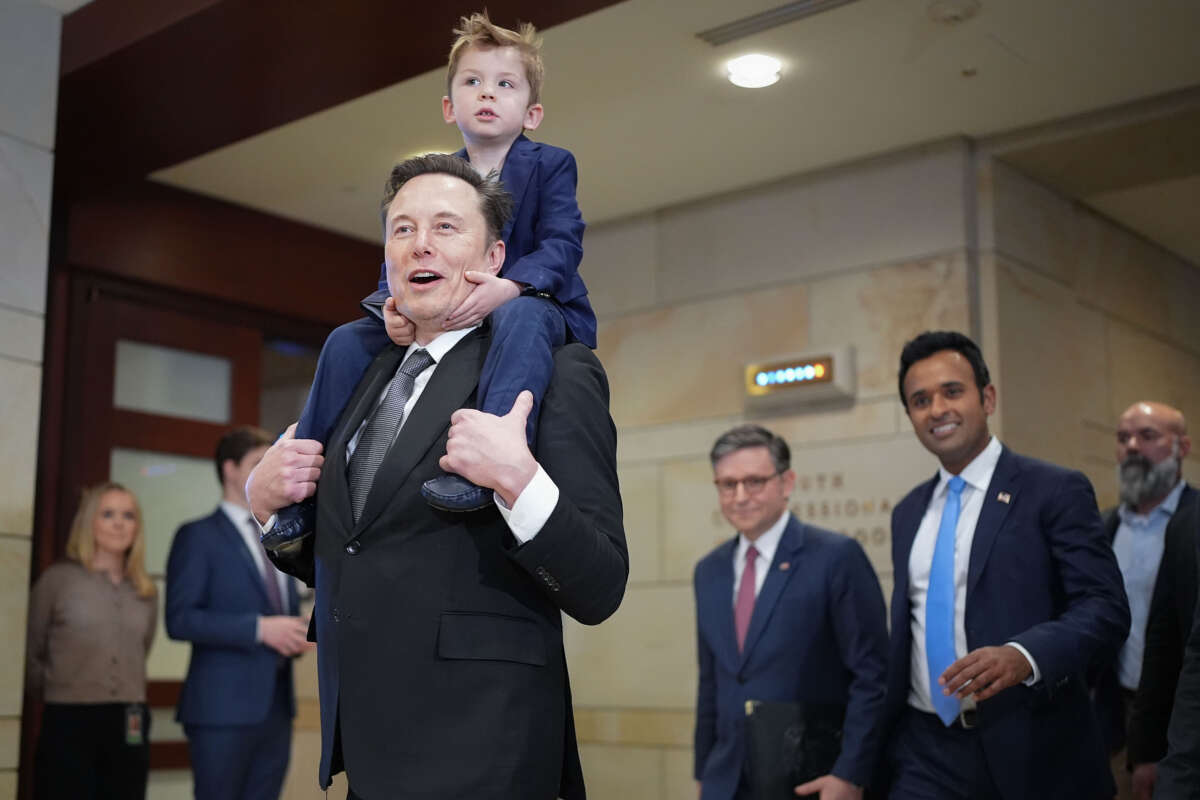Support justice-driven, accurate and transparent news — make a quick donation to Truthout today!
On Sunday, president-elect Donald Trump sought to assuage concerns that he will make cuts to Social Security and other safety net programs after Republicans signaled last week that Social Security could be targeted by Trump’s “Department of Government Efficiency” (DOGE) initiative, managed by Elon Musk and Vivek Ramaswamy.
Asked by host Kristen Welker on NBC’s “Meet the Press” program whether the DOGE initiative would include cuts to Social Security, Trump said “no,” other than perhaps cuts related to allegations of “abuse” or “fraud” associated with the program.
Notably, such fraud happens at extremely low rates — by one estimate, fraud equals around just $0.40 out of every $100 in benefits Social Security doles out yearly.
“We’re not touching Social Security, other than — we might make it more efficient,” Trump said about the national insurance program that helps retirees, disabled people, widowers and children of deceased parents. “But the people are going to get what they get.”
“We’re not raising ages or any of that stuff,” he added.
Trump’s comments echo talking points from his “Agenda 47” platform during his presidential campaign, which stated that he would “not cut one penny from Medicare or Social Security.” However, he and his allies have repeatedly suggested that cuts to both programs are possible.
Musk and Ramaswamy have made it evident that cuts to Social Security will be considered. After the two met with Republican lawmakers on Capitol Hill last week about the DOGE initiative, House Majority Leader Rep. Steve Scalise (R-Louisiana) said they had expressed sentiments that contradicted Trump’s comments on Sunday.
“Nothing is sacrosanct. Nothing. They’re going to put everything on the table,” Scalise told reporters after the meeting, with Fox Business elaborating that cuts to Social Security, Medicare and Medicaid would be discussed.
In September, when the idea of DOGE was first being discussed, vice president-elect J.D. Vance also indicated that there could be cuts to Social Security. A DOGE-type commission is “going to look much different in, say, the Department of Defense versus Social Security,” Vance said during a podcast interview, insinuating that cuts were going to be considered for the latter agency.
In March, Trump himself said that cuts to the program were a possibility.
“There is a lot you can do in terms of entitlements — in terms of cutting — and in terms of also the theft and the bad management of entitlements,” Trump said in a statement starkly different from his comments over the past weekend.
Perhaps most importantly, Trump attempted to make drastic cuts to Social Security and other programs in his first term as president. In one of his later proposed budgets (which didn’t go on to pass in the then-Democratic-controlled Congress), the president-elect sought to cut Social Security by $25 billion — despite promising in the 2016 presidential campaign that he wouldn’t make any cuts to the agency, just as he promised this last election cycle.
Polling consistently shows that Social Security is widely popular and that most American voters would oppose cuts to the program. An AP/NORC poll from 2023, for example, found that nearly 8 in 10 voters (79 percent) oppose slashing benefits to the program in order to deal with potential funding problems. Instead, most voters (58 percent) would like to see the wealthiest Americans contribute more in taxpayer funds to Social Security.
Media that fights fascism
Truthout is funded almost entirely by readers — that’s why we can speak truth to power and cut against the mainstream narrative. But independent journalists at Truthout face mounting political repression under Trump.
We rely on your support to survive McCarthyist censorship. Please make a tax-deductible one-time or monthly donation.
